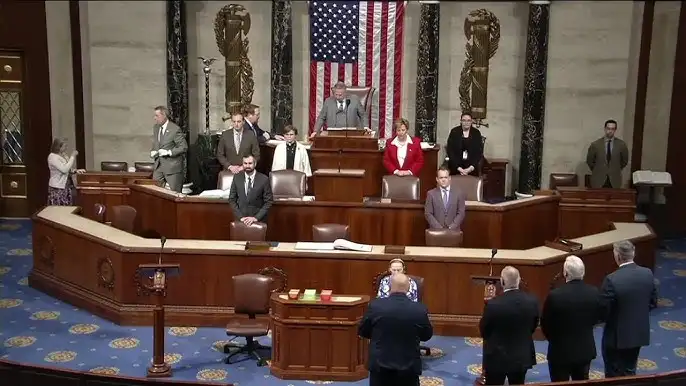After nearly eight weeks, the House of Representatives reconvened to vote on a Senate-passed bill to end the longest government shutdown in U.S. history, which began on October 1 and lasted for 43 days. This shutdown disrupted federal services, delayed travel, and left over a million federal workers without pay.
The proposed legislation funds three key spending bills and extends government funding until January 30, ensuring back pay and job security for federal employees. President Donald Trump hailed the bill as a “very big victory,” while Speaker Mike Johnson expressed hope for its passage, acknowledging the delay in reaching this point.
However, the bill lacks an extension of Affordable Care Act tax credits, which has become a major contention for Democrats. Democratic leader Hakeem Jeffries indicated that most Democratic lawmakers are likely to oppose the bill due to this exclusion. Though some Senate Democrats have reluctantly supported the measure, they failed to sway Republicans on healthcare subsidies.
The legislation also proposes increases in security funding and includes provisions to protect senator privacy rights during investigations. Future discussions are expected about extending COVID-era healthcare subsidies before their expiration at year-end. Republican opinions are divided on this issue; some are open to extending subsidies with income caps, while others, including Trump, advocate for the repeal of the Affordable Care Act.
The government shutdown has caused significant challenges, such as delaying SNAP benefits and impacting federal workers, while the Supreme Court temporarily blocked full SNAP payments, adding to the confusion for recipients. As the House votes on the bill, the nation hopes for a resolution to restore normalcy in federal operations and services.












Cant believe it took this long to vote on ending the shutdown! What were they waiting for? #abouttime #frustrating
I cant believe it took them this long to even vote on ending the shutdown! What a mess.
Why is it taking so long for the government to end the shutdown? Its like a never-ending rollercoaster ride. #frustrating
I cant believe it took this long for them to even consider ending the shutdown! What a waste of time and resources.
I cant believe it took them this long to even vote on ending the shutdown. What a ridiculous delay!
Cant believe it took them this long to vote on ending the shutdown! Better late than never, I guess. Hopefully, they get it sorted soon.
Why did it take so long for the House to finally vote on ending the shutdown? About time! #governmentshutdown #letsgo
I cant believe it took them this long to even vote on ending the shutdown! What a mess. About time!